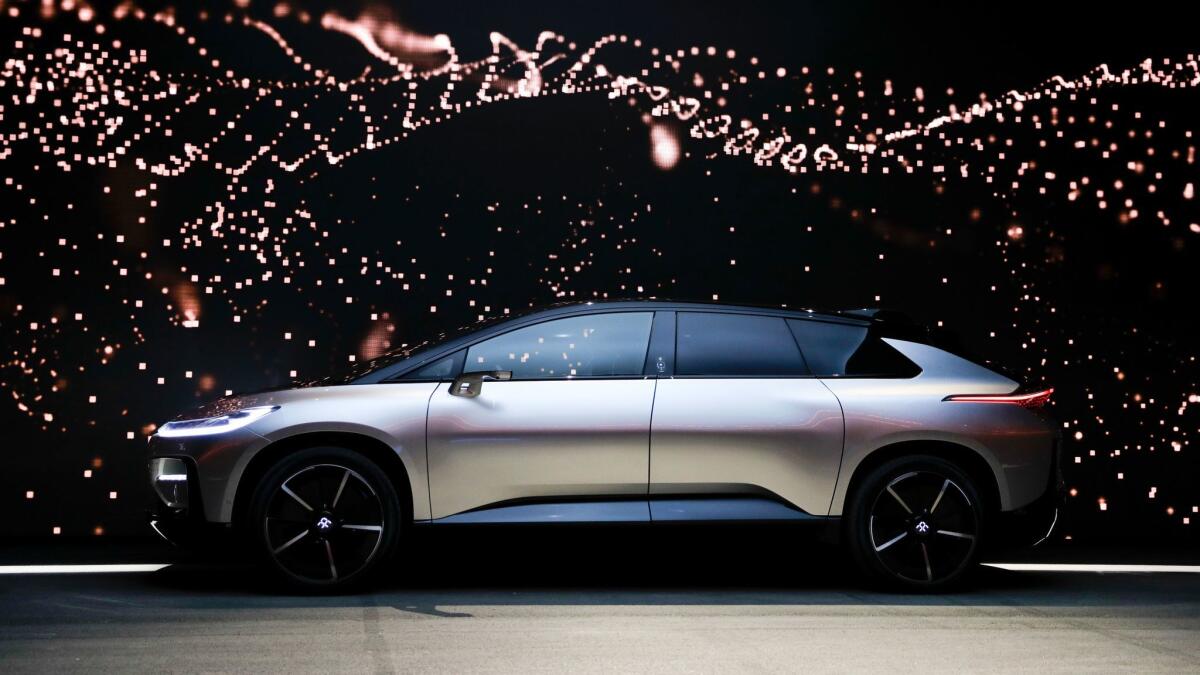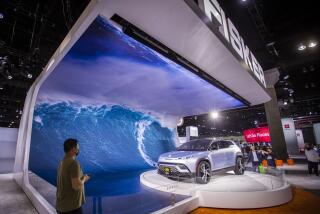Faraday Future plans to refurbish an old tire factory to take on Tesla

Reporting from San Francisco — Faraday Future is running on fumes. But it’s still running.
The Gardena-based luxury electric car start-up raised $14 million in emergency funding and will lease an old factory near Fresno that will enable it to turn out 10,000 cars a year.
The company has dramatically lowered its ambitions. Its goal now is to try to remain solvent enough to start manufacturing and selling the FF 91, a powerful, technology-packed luxurious electric sedan with a base price expected to top $100,000.
As recently as last year, the company had plans to turn out 150,000 cars a year from a massive new $5-billion assembly plant near Las Vegas.
Those plans were dashed when the company’s primary investor, Chinese entrepreneur and LeEco Chief Executive Jia Yueting, ran into severe financial difficulty in his home country, including a government-decreed freeze on assets. Faraday financing dried up, and the Las Vegas factory never got off the ground.
Last week, a two-year-old investment firm called Innovatus Capital Partners handed Faraday $13.75 million on a one-year loan, but not before laying claims to Faraday’s Gardena headquarters as collateral. The cost of the loan was not made public.
Faraday’s new factory sits along a two-lane road in Hanford, a town of 55,000, and a railroad crossroads. Armstrong Rubber Co. first opened the building in 1962 to manufacture tires. In 1985, Italian tire-maker Pirelli bought the factory but shut it down in 2001, citing foreign competition and lower wage rates in Brazil and Venezuela.
The building has been mostly empty since, though late last year a medical marijuana supplier sought city permission to use it as a grow farm and processing plant, provoking a debate over morals versus economic development in the conservative community. The company bowed out in March after the city said it would wait until after the Nov. 18 election to decide.
Then Faraday stepped in. About 400 of Faraday’s 1,000 Gardena employees volunteered to drive to the Hanford site on Saturday to “see it, touch it, work on it, paint an FF sign on it,” said Stefan Krause, the company’s chief operating officer, who joined Faraday in March.
A Deutsche Bank and BMW veteran, Krause is on the hunt for capital to keep Faraday alive. The recently borrowed $14 million is peanuts against the tens to hundreds of millions of dollars Krause must raise.
An assembly plant and a schedule for production will help, he said: “For investors, it makes it more real.” The Hanford plant covers a million square feet with a section more than 300 yards long once used for tire making, the right shape and length for an auto assembly line.
When Krause came in last March, he saw how much time and money a brand new plant would require, and steered the company in a new direction. The need for speed is urgent, he said. “It’s strategically important to be the second (luxury electric car) after Tesla.”
A luxury electric car start-up based in Silicon Valley, Lucid Motors, is also seeking new capital as it races against Faraday and others, including Lynk & Co., a new luxury electric car maker in China that plans to sell in the U.S. through Volvo dealerships.
If Faraday’s plans are met, the first production cars will come off the line headed for customers by the end of next year.
Twitter: @russ1mitchell







